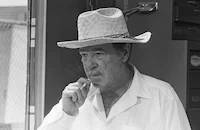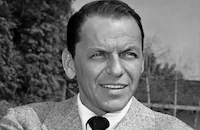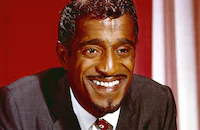Robin and the 7 Hoods

Brief Synopsis
Cast & Crew
Gordon Douglas
Frank Sinatra
Dean Martin
Sammy Davis Jr.
Bing Crosby
Peter Falk
Film Details
Technical Specs

Synopsis
During the Depression, gangster chieftain Big Jim is assassinated by Guy Gisborne and his cronies while celebrating his birthday. A war of attrition between rival gangsters Robbo and Gisborne is interrupted when Big Jim's daughter, Marian, posts a reward of $50,000 to avenge her father's death. Believing Glick, a crooked sheriff whom Gisborne has killed, to be her father's murderer and Robbo to be her avenger, Marian gives Robbo the reward. Aware that he is undeserving, Robbo donates the money to an orphanage administered by Allen A. Dale. When Robbo consequently acquires a reputation as a philanthropist, he hires Dale as his minister of finance. Marian, however, charms the rivals, instigating a gang war during which Robbo is imprisoned for the sheriff's murder and Gisborne is slain. Although the freed Robbo vows vengeance, Marian persuades the women of Chicago to rid the city of racketeers. Under reformist guise, she attains gangland supremacy. She then installs herself in the offices of the Women's League for Better Government, from which, aided by Allen A. Dale, she conducts her illegal operations.
Songs : "My Kind of Town" (Robbo), "Don't Be a Do-Badder" (Allen & kids), "Mr. Booze" (Robbo, John, Will, Allen), "Any Man Who Loves His Mother" (John), "Bang Bang" (Will), "Style" (Robbo, John, Allen), "All for One and One for All" (Guy), "Charlotte Couldn't Charleston" (chorus).

Director

Gordon Douglas
Cast

Frank Sinatra

Dean Martin

Sammy Davis Jr.

Bing Crosby

Peter Falk

Barbara Rush

Edward G. Robinson

Victor Buono
Barry Kelley
Hank Henry
Robert Carricart

Allen Jenkins

Jack Larue

Hans Conried

Sig Ruman
Robert Foulk
Sonny King
Phil Crosby

Richard Bakalyan
Phil Arnold
Harry Swoger

Joseph Ruskin
Bernard Fein
Carol Hill
Diane Sayer
William Zuckert
Richard Simmons
Milton Rudin
Maurice Manson
Chris Hughes
Harry Wilson
Joe Brooks
Richard Sinatra
Roger Creed
Carolyn Morin
Aldo Silvani
Joe Gray
John Delgado
Boyd "red" Morgan
John Pedrini
Al Wyatt

Tony Randall
Eddie Ness
Frank Scannell
Thom Conroy
Joey Jackson
Linda Brent
Jerry Davis
Manuel Padilla
Mark Sherwood
Crew
Gordon Bau
Raphael Bretton
Sammy Cahn
Thom Conroy
William H. Daniels
William H. Daniels
Leroy Deane
Don Feld
Gil Grau
Everett Hughes
Howard W. Koch
Sam O'steen
Jean Burt Reilly
Nelson Riddle
David Salven
David R. Schwartz
Frank Sinatra
James Van Heusen
Vinton Vernon
Lee White

Photo Collections
Videos
Movie Clip






Hosted Intro





Film Details
Technical Specs

Award Nominations
Best Score
Best Song
Articles
Robin and the 7 Hoods
The screenplay by David R. Schwartz takes a vague Damon Runyan-style approach to the Robin Hood legend, transferring some names and incidents to the gangland Chicago of the 1920s. The opening of the film is one of its best scenes, as a conference of mobsters brings out a birthday cake for boss Big Jim (Edward G. Robinson in an unbilled cameo). The "celebration" ends in a hail of bullets as Big Jim is killed and Guy Gisborne (Peter Falk) tries to take control of the North Side. His adversary is Robbo (Frank Sinatra), Big Jim's hand-picked successor. Big Jim's daughter Marian (Barbara Rush) wants Robbo to rub out the gang that killed her father and gives him fifty thousand dollars. Robbo sends his pal Will (Sammy Davis, Jr.) to give the money to the local orphanage instead. When orphanage worker Allen A. Dale (Bing Crosby) takes the story to the press, Robbo and his gang become Robin Hood-like heroes to the public. Marian then uses her charms to sway Robbo's pal Little John (Dean Martin) to help her in a counterfeiting scheme and use Robbo's charity as a front. Meanwhile, Guy and Robbo take turns destroying each other's illegal nightclubs, because, as Little John puts it, "When your opponent is left holding all the aces, only one thing left to do - kick over the table."
Following the release of Sergeants 3, both Peter Lawford and Joey Bishop had fallen out of favor with Sinatra, so for the latest film a new name was added to the Clan, Sinatra's singing idol and his co-star from High Society (1956), Bing Crosby. With the addition of Crosby, Robin and the 7 Hoods became a full-blown musical, and producer Sinatra recruited songwriter pals Cahn and Van Heusen to write the tunes and his longtime arranger Nelson Riddle to score the film. To direct, Sinatra initially brought in an old colleague from his MGM contract days, Gene Kelly. Three weeks before the start of principal photography, however, Kelly was out. Some sources indicate that Sinatra was uncomfortable with the level of choreography Kelly was planning for the picture; Sinatra cryptically told the New York Post, "If you're the producer, you're supposed to make the decisions. I wasn't making any decisions. I was taking orders." Gordon Douglas was brought on to helm the picture; Sinatra felt that the veteran director had gotten a good performance out of him in the Warner Bros. musical Young at Heart (1954), with Doris Day.
Having surrounded himself with friends and trusted colleagues, Sinatra should have had a smooth time shooting Robin and the 7 Hoods; it turned out to be anything but smooth. Years later, in fact, co-star Victor Buono remarked, "It's amazing the movie got finished." The first delay on the film occurred when President Kennedy was killed in Dallas; Sinatra had been a tireless campaigner for Senator Kennedy in 1959 and a great personal friend (although the relationship became strained after JFK's Inauguration). Frank Sinatra, Jr. is quoted in the book Sinatra Treasures on the assassination and an eerie premonition his father experienced on location: "They were filming a scene at a cemetery on 3rd Street and Western Avenue (when they bury Big Jim). My father told me [that] on that day, in between takes, he stepped out of the shot and sat on a tombstone to have a cigarette, and when he looked down on a grave it read, 'John F. Kennedy 1883-1940.' The next day they were filming again in the cemetery, and he was in a car when it came over the radio that President Kennedy had been assassinated. They were in the middle of a take, and my father went over to director Gordon Douglas and put his hands up and told Gordon to cut. That alone delayed the picture a good ten days."
The other major delay on Robin and the 7 Hoods occurred soon after the death of the President, when on December 8, 1963, nineteen-year-old Frank Sinatra, Jr. was kidnapped at knifepoint in Lake Tahoe and held for ransom. With friends in high places, Sinatra Sr. consulted with both Attorney General Robert F. Kennedy and with FBI Director J. Edgar Hoover before meeting the demands and handing over $240,000. Five days after his abduction Frank Jr. was released unharmed and two days after that the authorities captured the rather amateurish kidnappers. Of course, production of the film was shut down during the entire ordeal. By all accounts, Sinatra had lost all enthusiasm in the project by this time and the remaining filming was rushed. According to Lew Irwin, author of Sinatra: A Life Remembered, "he wrapped up filming... so fast that he did not include a Sammy Cahn-Jimmy Van Heusen song that Cahn thought was one of the best he had ever written for Sinatra...Cahn later called this omission 'the one great disappointment with Frank Sinatra in my life.'"
Robin and the 7 Hoods opened in Los Angeles on June 29, 1964 and in New York on August 5th; critical response was mixed. Life magazine's Richard Oulahan offered a rave, after first listing the other "Clan" movies, which he judged to be "mistakes." "To my utter surprise," he wrote, "it turned out to be a swinging film, fast-moving and lighter-than-air....Here a plot is merely a place where stiffs are planted. The characters, the gags, the color, the songs and the goofy situations are what count. And they count up to a lucky seven." Oulahan writes that "the songs are unmemorable, yet they all fit the occasion like diamond cuff links on a white-on-white shirt. ...With this off-gait, off-beat film, Sinatra and the Clan have finally made their point. I sincerely hope that they will stop, now that they're ahead."
Meanwhile, the critic for Time magazine was less impressed, writing that "Robin and the 7 Hoods is less exciting than Little Caesar, less convincing than The Roaring Twenties, and less tuneful than Guys and Dolls....The actors snap their fingers at the plot, and ...the rest of the film runs to self-parody, augmented by boyish enthusiasm for booze, broads, violence and bad grammar. Though 7 Hoods offers negligible entertainment value, it does provide innocuous occupational therapy for the western world's best-paid gang of rebels without a cause." Variety claimed the film was only "slightly wacky" but had praise for the performances: "[Peter] Falk comes out best. His comic gangster is a pure gem. Sinatra, of course, is smooth and Crosby in a 'different' type of role rates a big hand." In The Hollywood Reporter, James Powers called the film "...better than its predecessors because there are not so many inside jokes, because there is more story and with it, new jokes, and because the stars work harder." Bosley Crowther of the New York Times dismissed the effort completely, calling it "an artless and obvious film."
In spite of the grousing of Mr. Crowther, Robin and the 7 Hoods did respectable business at the box-office, even in the year of Beatlemania. There may have been too much plot getting in the way of the music, but response to the Cahn and Van Heusen tunes was positive. Each artist gets a showcase number, as Dean croons "Any Man Who Loves His Mother" while ironically hustling pool, Davis cavorts through "Bang! Bang!" while destroying a nightclub, and Bing relives a little Going My Way (1944) magic as he croons "Don't be a Do-Badder" with a group of orphans in tow. Sinatra's "My Kind of Town" is a showstopper, of course - it was nominated for an Oscar® as Best Music, Original Song (it lost to "Chim Chim Cher-ee" by the Sherman brothers from Mary Poppins). There is also a memorable group effort on "Mr. Booze," a tongue-in-cheek ditty concerning the evils of alcohol. Aside from a rushed and nonsensical ending, there is little evidence of Sinatra's behind-the-scenes travails in the final film, and it is hard to challenge the joy evident in the number "Style", a mid-film sequence which showcases the trio of Sinatra, Martin, and Crosby in a simple setting performing a soft-shoe routine in natty evening wear. As Tom Santopietro writes in Sinatra in Hollywood, "No one knows what's happening in the plot, there's no sense that the three men are even playing characters, and it doesn't matter one damn bit. The audience is simply watching Frank, Dean, and Bing in top form, and that's plenty good enough. Sinatra appears to be having an absolute ball -- and with good reason. He is performing a clever song with his onetime idol (Crosby) and his best film pal (Martin)."
Robin and the 7 Hoods would turn out to be the last movie musical appearance by both Bing Crosby and Frank Sinatra. After its release, Sammy Davis, Jr. began a long run on Broadway in the show Golden Boy, and while Dean Martin made another film with Sinatra, the comedy Marriage on the Rocks (1965), he also began production on his long-running TV series The Dean Martin Comedy Hour (1965-1974). Gordon Douglas went on to direct Sinatra in his trio of late-1960s detective films: Tony Rome (1967), The Detective, and Lady in Cement (both 1968).
In 2010 Robin and the 7 Hoods was adapted to a stage production with a new book by Tony Award-winning Rupert Holmes which keeps the main characters and Chicago setting but throws out much of the convoluted plot of the original. The stage adaptation also adds many other more famous Cahn and Van Heusen songs, such as "Come Dance with Me," "Call Me Irresponsible," "Ain't That a Kick in the Head," and "High Hopes."
Producer: Frank Sinatra
Director: Gordon Douglas
Screenplay: David R. Schwartz
Cinematography: William H. Daniels
Production Design: LeRoy Deane
Music: Nelson Riddle
Songs: Sammy Cahn and James Van Heusen
Film Editing: Sam O'Steen
Cast: Frank Sinatra (Robbo), Dean Martin (Little John), Sammy Davis, Jr. (Will), Bing Crosby (Allen A. Dale), Peter Falk (Guy Gisborne), Barbara Rush (Marian Stevens), Victor Buono (Deputy Sheriff Alvin Potts), Hank Henry (Six Seconds), Robert Foulk (Sheriff Octavius Glick), Allen Jenkins (Vermin Whitouski)
C-124m.
by John M. Miller
SOURCES:
Sinatra in Hollywood, Tom Santopietro, 2008, Thomas Dunne Books.
Sinatra Treasures: Intimate Photos, mementos, and Music from the Sinatra Family Collection, Charles Pignone, 2004, Bulfinch.
Gonna Do Great Things: The Life of Sammy Davis, Jr., Gary Fishgall, 2003, Scribner.
Sinatra: A Life Remembered, Lew Irwin, 1998, Running Press.

Robin and the 7 Hoods
Robin and the 7 Hoods
Set in 1920's Chicago, Robin and the 7 Hoods opens with the city's chief gangster (Edward G. Robinson) being forcibly shuffled off this mortal coil. His replacement (Peter Falk) has big plans but he didn't take into account the competing gangster Robbo (Sinatra) and his band of not-quite-merry men. With his new sidekick Little John (Martin), Robbo sets about the humorously complicated business of rebuilding bombed nightclubs, laundering money through orphanages and avoiding bullets. Along the way he discovers the charms of Marian (Barbara Rush, later on TV's All My Children and 7th Heaven) not to mention whether crime really does or does not pay.
Robin and the 7 Hoods was shot late during 1963, not one of Sinatra's better years. The same day they filmed a funeral scene they learned that President John F. Kennedy had been assassinated. A couple of weeks later they were preparing for a kidnapping scene when news came that Sinatra's son had in fact been kidnapped. Frank Jr. was recovered with no harm but the kidnapping scene never made it into the completed film.
As Newsweek so aptly said, "To get the film done would have been laudable; to get it funny was heroic." The songs - "My Kind of Town," "Style," "Mr. Booze," & "Don't Be a Do-Badder" - were the work of Sinatra faves Sammy Cahn and James Van Heusen who even got an Oscar® nomination for "My Kind of Town", which has since become something of a Chicago anthem. Composer Nelson Riddle matched them with a nomination for his score.
Director: Gordon Douglas
Producer: Frank Sinatra, Howard W. Koch
Screenplay: David R. Schwartz
Cinematography: William H. Daniels
Editor: Sam O'Steen
Music: Nelson Riddle
Cast: Frank Sinatra (Robbo), Dean Martin (Little John), Sammy Davis Jr. (Will), Bing Crosby (Allen A. Dale), Peter Falk (Guy Gisborne).
C-124m.
by Lang Thompson
Robin and the 7 Hoods
Quotes
Be careful or six of your best friends will be carrying you by the handles.- Little John
When your opponent's sittin' there holding all aces, there's only one thing left to do: Kick over the table.- Little John
Trivia
A scene depicting a kidnapping was filmed, but cut when star Frank Sinatra's son was kidnapped.
On the same day as the funeral scene was filmed, President John F. Kennedy (a personal friend of Sinatra's) was assassinated.
The two lesser known Rat Packers, Joey Bishop and Peter Lawford, don't appear in this film. They are "replaced" essentially by Bing Crosby and 'Peter Falk' .
Notes
Copyright length: 120 min. Prerelease title: Robbo. Sources conflict in crediting the role of the prosecutor.

Miscellaneous Notes
Released in United States Summer June 27, 1964
Released in United States Summer June 27, 1964













